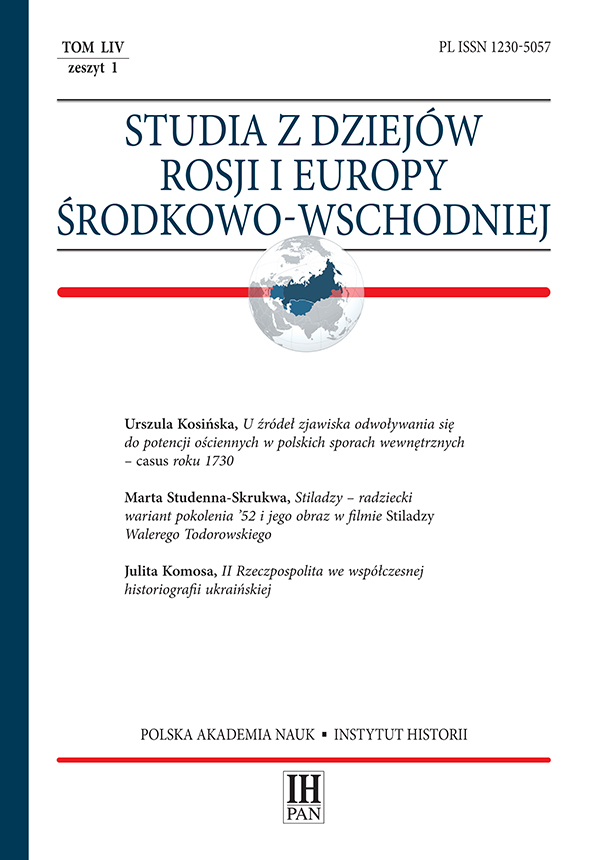„Refl eksje” kanclerza koronnego Jana Małachowskiego (1755–1757)
The “Reflections” by Great Crown Chancellor Jan Małachowski (1755–57)
Author(s): Tomasz SzwacińskiSubject(s): History, Diplomatic history, Oral history, Political history, Modern Age, 18th Century
Published by: Instytut Historii im. Tadeusza Manteuffla Polskiej Akademii Nauk
Keywords: Polish-Lithuanian Commonwealth; tsarist Russia; Saxony; Warsaw; St Petersburg; Dresden; Jan Małachowski;
Summary/Abstract: In 1753, Great Crown Chancellor Jan Małachowski joined the so-called “Kolbuszowa party”, which meant his entering into conflict with the Saxon-Polish court. Despite this, he did not intend to remain in opposition, although he ruled out agreement with the leader of the new court party, Jerzy August Mniszech. In 1755, he began correspondence with the first Saxon minister Heinrich Brühl and with the secretary of the Russian mission in Warsaw Jan Rzyszczewski. He intended to gain decisive influence on the situation in the Commonwealth through Russian protection, and the Dresden court would be forced to accept this situation. The article presents and analyses Russian diplomatic correspondence on this issue. The Russians agreed to Małachowski’s presentation of his project of arrangement of Polish affairs.In October 1755, the chancellor presented Rzyszczewski with his “Reflections”. He wrote in them that although Russia had always wanted to keep peace in Poland and to observe the laws, it was portrayed by supporters of France as a force using violence. Even if that was the case, wrote the chancellor, it served the Poles themselves. Russia’s attitude to Poles he compared to a father using the rod to discipline his unruly children. Małachowski asked that a new Russian ambassador be quickly appointed in Poland, who would be a mediator in conflicts. As a model, he cited the example of the impartial mediation of Tsar Peter I between August II and the confederates in 1716. At the end of the project, Małachowski suggested that the new Russian diplomat should organise Polish affairs through the persons of Polish primate and chancellor. This was to serve Małachowski to become an administrator of order in Poland alongside the new Russian ambassador. St Petersburg’s response to Małachowski’s proposals was cautious, the case was being postponed. The immediate effect was that in 1756 the chancellor was put back on the Russian pay list with the amount of 7,000 rubles a year.In April 1756, a decision was made in St Petersburg to send a new diplomat to Poland. Although this was due to the broader plans of Russia, Małachowski was told that this step was due to his requests. Encouraged by this declaration, the chancellor began new negotiations with Brühl, and kept St Petersburg informed in detail. He told the Saxon first minister that Russia had offered him partnership in resolving Polish conflicts. However, due to the silence of St Petersburg, the matter was brought to an impasse. It was only in March 1757 that the text of Małachowski’s “Reflection” was quoted as a fragment of instructions for the new Russian diplomat in Poland, Mikhail Volkonsky. Małachowski, however, did not obtain any personal benefits from this.
Journal: Studia z Dziejów Rosji i Europy Środkowo-Wschodniej
- Issue Year: 54/2019
- Issue No: 1
- Page Range: 27-57
- Page Count: 31
- Language: Polish

